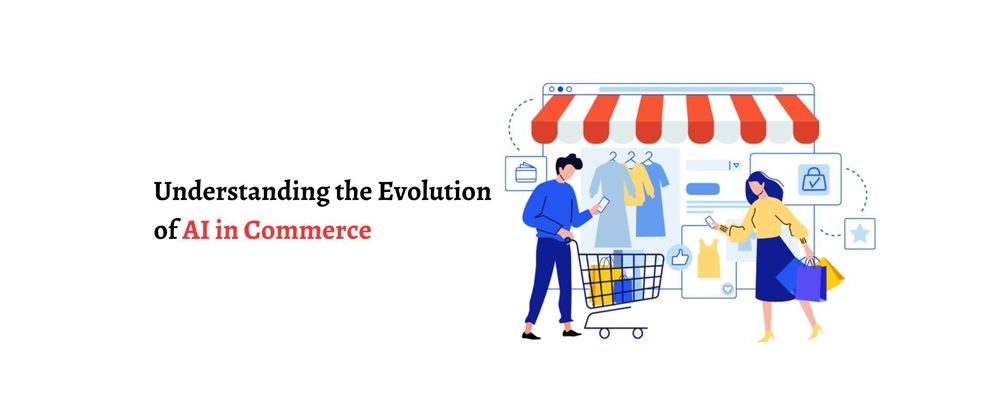Artificial intelligence (AI) has revolutionized how businesses operate and has created new opportunities in every industry, and especially in the retail sector. But to be able to transform this sector, there has been multiple model trainings that this technology has undergone in the past couple of years. From rule-based systems to smart response generation, AI has served it all. This blog will provide a comprehensive overview of the evolution artificial intelligence has witnessed. And to implement AI capabilities within your online store, take assistance from a professional eCommerce development company.
The Evolution of AI on the Commerce Sector: Diving into the History
We all are aware of the fact that John Mccarthy in 1955 coined the term artificial intelligence predicting that it will become the first-ever technology disruption that will last for decades to come. But that’s not when the birth of AI was first predicted or thought of. Going back a little further in the history, the Philosopher and scientist Rene Descartes proposed that one-day machines could think and make decisions like human beings.
This was the first time the capabilities of a machine were challenged and today we are witnessing it, working with it. Many other philosophers contemplated how human thinking could be artificially mechanized and manipulated by intelligent non-human machines.
The thought processes that fueled interest in AI originated when classical philosophers, mathematicians, and logicians considered the manipulation of symbols (mechanically), eventually leading to the invention of the programmable digital computer, the Atanasoff Berry Computer (ABC), in the 1940s. This specific invention inspired scientists to move forward with the idea of creating an “electronic brain,” or an artificially intelligent being.
Historical Overview of AI Adoption in Commerce
AI's journey in commerce has transitioned from simple, rule-based systems to sophisticated machine learning algorithms and deep learning models that can handle and optimize complex tasks.
- Early AI Applications (1990s - Early 2000s)
Rule-Based Systems and Decision Trees: Initial AI applications were based on rule-based systems that could automate repetitive tasks such as sorting emails or basic customer service inquiries. These systems relied on predefined rules and lacked flexibility and adaptability.
Collaborative Filtering and Recommender Systems: One of the earliest and most significant AI applications in commerce was collaborative filtering, which powered recommendation engines. Companies like Amazon and Netflix were the early adopters who leveraged these systems to suggest products and content based on user behavior, laying the foundation for personalized commerce, which in those years wasn’t even a sheer customer demand.
- The Rise of Chatbots and VAs (Mid-2000s - 2010s)
The mid 2000s witnessed rapid advancements in Natural language processing (NLP) models which brought virtual assistants and chatbots to the frontfoot to replace traditional customer service and expedite the process. The chatbots have come a long way from Eliza in 1966 to Google Gemini in 2023.
While the former worked by merely passing the words that users entered into a computer and then pairing them to a list of possible scripted responses, the latter is a more advanced model that utilizes advanced algorithms and has been exclusively trained on massive amounts of data to generate incredibly accurate and human-like responses to the customer queries, provide better recommendations, and assign the complaint to a human agent if the case becomes more complex.
Virtual Assistants have been a game-changer too. We all know about Alexa, right? Well, Alexa has undergone multiple tests to be able to enable voice commerce that many customers prefer today over touch-based online commerce.
The development firm you hire for eCommerce development services will build an AI-enabled chatbot for your online store so that you can improve your customer service operations.
- Deep Learning and Complex Advancements (2015 - Present)
Deep Learning Architectures: The introduction of deep learning models, such as Convolutional Neural Networks (CNNs) and Recurrent Neural Networks (RNNs), enabled more sophisticated AI applications like image-generation and voice recognition. These models significantly improved the accuracy of product recommendations, customer sentiment analysis, and fraud detection.
With more complex advancements in deep learning models, AI began to handle more dynamic requirements particularly in optimizing supply chain management and dynamic pricing strategies. You can hire a professional firm offering eCommerce development services to build a custom AI solution for supply chain management. They will ensure the model has in-built deep learning
AI-Driven Insights and Automation: Today, AI applications in commerce include predictive analytics, visual search, voice commerce, and automated quality control, enhancing efficiency across the entire value chain.
Also read A Guide to Creating Multilingual eCommerce Websites
Conclusion
AI will be the catalyst in the growth of commerce. But it didn’t happen overnight. The evolution of AI has come a long way from rule-based AI systems to smart content generation models such as ChatGPT. This blog will help you understand the comprehensive detail of this evolution and to implement AI capabilities within your online store hire a reliable eCommerce development company as they can understand your specific requirement and build a custom solution accordingly.



Top comments (0)